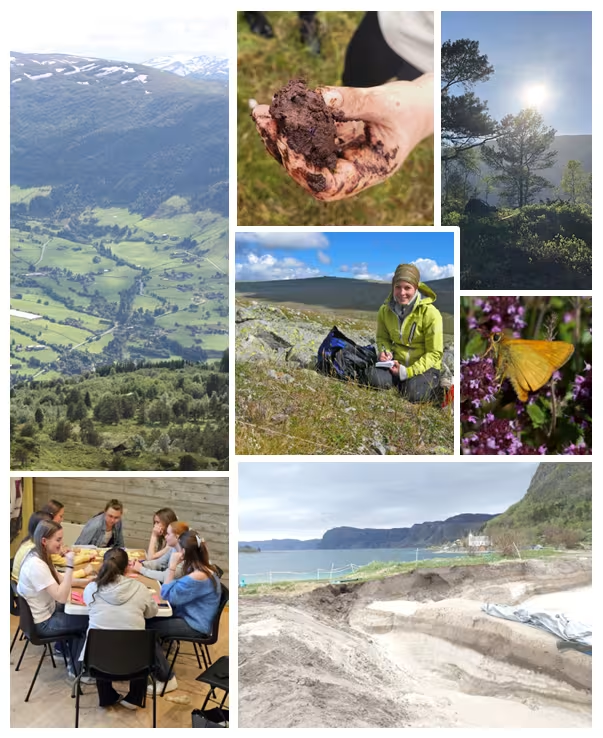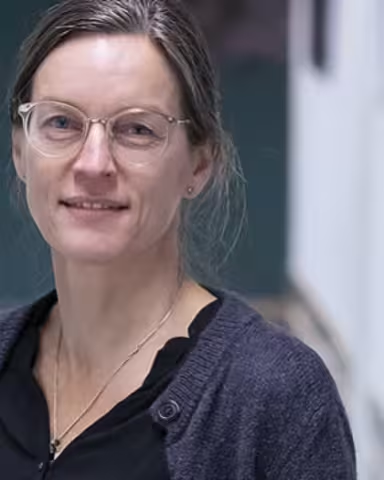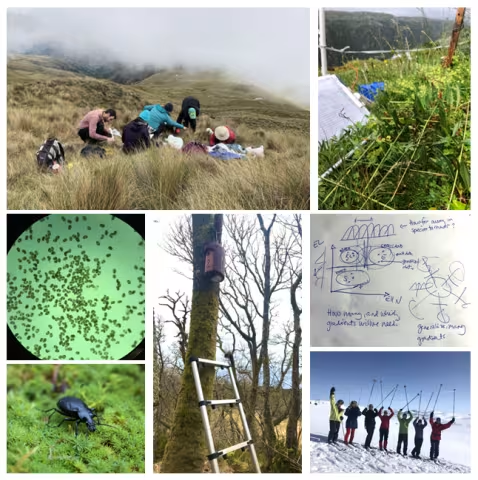Terrestrial Ecology
Multi- and inter-disciplinary research with a long-term perspective and broad spatial extent, focusing mainly on terrestrial systems

About the research group
Life on land and the ecosystems and functions and services it underpins are undergoing pronounced changes. Our research aims to provide a knowledge base that informs the prediction and mitigation of global change impacts on terrestrial ecosystems, now and in the future. We focus our research within three main areas:
- Ecological and evolutionary processes in the past, present and future;
- Biodiversity and ecosystem dynamics under global change;
- Social-ecological systems.
In doing so we aim to generate fundamental scientific insights that also contribute to scientifically informed and evidence-based decision-making in society.
We collaborate in several large international ecological projects, including distributed experiments, knowledge-sharing platforms, and large research consortia. Reproducibility and open science are embedded in our approaches. We involve stakeholders in our science locally, nationally, and internationally. We are inclusive with regards to background, gender, and career stage. Further, we communicate our science across a broad spectrum of channels, from high-profile publications to the science-policy interface and popular science. This ensures that we reach the appropriate audiences and have impact within science and across society.
Our research is carried out within seven research teams. See below for more info about each team.
Master's studies in biology
A master's project in our group offers the opportunity to engage in field or laboratory experiments that identify drivers of biodiversity or evolutionary change, reconstructions of long-term ecological processes using ancient pollen grains, and mapping land-use changes and social values related to ecosystem services and sustainable development. This work can be done in different biomes (arctic, alpine, temperate, desert, tropical), but mainly in terrestrial ecosystems, and at different geographical locations (across Norway, and in many other localities around the world).
What pulls us together as a group is a focus on (the effect of) environmental and ecological change on species or ecosystems and the collaborative effort to develop good field and statistical methods to enable us to answer complicated questions using "real" field data. Most of us collect our own data in the field, but some use data collected as part of larger projects or from databases.
Research highlights
Recent publications include
Drought intensity and duration interact to magnify losses in primary productivity (external link)
Projects
Ecological and evolutionary processes
Ecological research on the past, present and future
2025–2029 EcoBudgets: Actionable budgets for sustainable climate and nature. NFR
2025–2028 Laschamps-UV: Reconstructions of UV-B radiation across the Laschamps Geomagnetic Excursion. NFR Friprosjekt 351985
2020-2027 ParAnthropE: Anthropogenic Parasite Evolution. NFR Grunnforskning project 287405.
2021–2025 FUNDER: Direct and indirect climate impacts on the biodiversity and FUNctioning of the UNDERground ecosystem. NFR KLIMAFORSK project 315249.
2021–2025 QUEST-UV: Quantitative estimates of past UV-B irradiance from fossil pollen. NFR project 324670.
2019–2025 DYNAMIC: Reducing fire disaster risk through dynamic risk assessment and management. Norwegian Research Council BRANNSIKKERHET project 298993.
Global change
Biodiversity and ecosystem dynamics under global change
2025–2027 NatuRA: Sustainable use of Natural Resources in Alpine and mountain grassland ecosystems under global change. NFR & SANRF
2023–2027 DURIN: The underappreciated roles of dwarf-shrubs in responding to and influencing global climate change. NFR FRIMEDBIO project 325645.
2022–2026 PPF-Alpine: The Past, Present and Future of Alpine Biomes Worldwide. Trond Mohn Stiftelse and UiB
2021–2025 EcoMAP: Modelling Ecological state and Condition Maps to support knowledge-based decision-making in Area management and spatial Planning. NFR project KSPSamarbeid20 project 320602.
2021–2024 RangeX: Mechanisms underlying the success and impacts on biodiversity and ecosystem functioning of range-expanding species under climate change. Biodiversa project 578 / NFR 325645.
Social-ecological systems
Research with a strong social element as well as ecology
2025–2028 SAFER: Strengthening Agricultural landscape multiFunctionality through expansion of agroecological farming in EuRope. NFR International Collaboration project
2023–2027 ACTIONABLE: Adaptive co-management to enhance biocultural diversity and sustainable development in coastal communities. NFR Areas Under Pressure project.
2023–2026 BECOME: Biospheres as Effective Conservation Measures. Biodiversa project.
2021–2025 BIOSPHERE: Activating local resources; cultivating regional cooperation for sustainable land-use. NFR Areas Under Pressure project.
2021–2024 CULTIVATE: Co-creating cultural narratives for sustainable rural development. International project with funding from UK AHRC, Czech MŠMT, NFR, and Estonian ETAg
Education, open science, and science policy
2024–2028 INTEREST: INTegrating Ecological Research and Education to fill Societal knowledge needs on the naTure crisis. Norwegian Directorate for Higher Education and Skills NORPART project 10096.
People
Group manager
Alistair Seddon Group Leader; PI Palaeochem
Group members
Anne Bjune Professor; Head of Education. Palaeoecologist
Pete Manning Professor. Global change ecology
Adele Mennerat Associate Professor. Animal ecology
Inger Måren Professor; UNESCO Chair of Sustainable Heritage and Environmental Management. Social-ecology
Richard Telford Associate Professor. Data analyst and coding in R
Ørjan Totland Professor. Pollination ecology
Vigdis Vandvik Professor; Leader of Between the Fjords; Director of Centre for Sustainable Area Management. Ecology
Alicia Barraclough Researcher. Actionable project
Vivian Felde Researcher. Quantitative analyst
Suzette Flantua Researcher. Mountain palaeoecology
Sonya Geange Researcher. Ecology
Aud Halbritter Researcher. Alpine ecology
Post-docs
Jarrod Cusens Post-doctor. Social-ecological systems
Ragnhild Gya Post-doctor. Biology didactics
Katja Malmborg Post-doc. Biosphere project
Jeanne Rezsöhazy Post-doctor. DURIN project
Tian-Yuan Wang Post-doctor. Laschamps-UV project
PhD students
Nadine Arzt PhD. RangeX project
Kristine Birkeli Phd. DURIN project
Freya Coursey PhD. Birds and their parasites
Peter Groth Farsund PhD. Funder project
Josph Gaudard PhD. Three-D project
Helene Müller Haugan PhD. Pollination and bees
Hanif Kawousi PhD. EcoBudgets project
Morgane Kerdoncuff PhD. Small-scale farming and biodiversity in Nordhordland
Mika Kirkhus PhD. DURIN project
Marte Klemetsdal PhD. Social consequences of ecological change
Mayke Nieuwkerk PhD. QUEST-UV project
Christian Quintana PhD. Long-term climate change and carbon dynamics
Eline Rentier PhD. Past, present, and future of alpine biomes project
Ieve Rozite-Arina PhD. Nordhorland UNESCO biosphere reserve
Laymara Sampaio PhD. South American palaeoecology
Lotta Schultz PhD. Past, present, and future of alpine biomes project
Janne Thomsen PhD. Social-ecological systems
Technicians/Admin
Susanne Berthelsen Lab Technician; Fieldworker
Dagmar Engelkraut Administrator, Between the Fjords and CeSAM
Cathy Jenks Administrator; Lab Technician
Linn Cecilie Krüger Lab Technician; Purchasing; Fieldworker
Emeriti
Hilary Birks Professor Emerita. Palaeoecology and plant macrofossils
John Birks Professor Emeritus. Quantitative palaeoecology
Peter Emil Kaland Professor Emeritus. Heathland Centre
Larry Kirkendall Professor Emeritus. Bark beetles
Aage Paus Professor Emeritus. Palaeoecology
Associate Members
Kari Hjelle Dean, Museum Director
Ole Reidar Vetaas Professor, Department of Geography
Inge Althuizen Researcher
Tessa Bargmann Researcher
Arild Breistøl Senior Engineer
Joe Chipperfield Researcher
Mari Jokerud Researcher
Rob Lewis Researcher
Joachim Töpper Researcher
Gaute Velle Researcher
Contact
See under 'People' if you wish to contact researchers directly or contact admin via the email below.
- Emails
- cathy.jenks@uib.no



